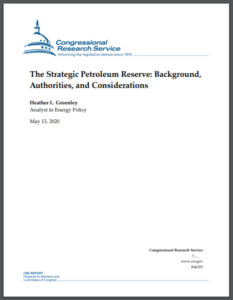Full Title: The Strategic Petroleum Reserve: Background, Authorities, and Considerations
Author(s): Heather L. Greenley
Publisher(s): Congressional Research Service
Publication Date: May 13, 2020
Full Text: Download Resource
Description (excerpt):
Crude oil price volatility has consequences for the U.S. and global economy. The Strategic Petroleum Reserve (SPR), the U.S. stockpile of petroleum, has played a role in U.S. energy policy for over 40 years. The need for a stockpile of petroleum to help protect against supply disruptions became apparent after the 1973-1974 Arab oil embargo, during which time the average price of imported crude oil tripled.
The oil embargo also fostered the establishment of the International Energy Agency (IEA), an intergovernmental organization, and the development of coordinated plans and measures among IEA members for emergency responses to energy crises. Strategic petroleum stock holdings are one policy included in the agency’s International Energy Program (IEP) agreement. As an IEA member and IEP signatory, the United States must meet certain stock holding thresholds and be prepared for a coordinated response during an emergency. In 1975, Congress passed the Energy Policy and Conservation Act (EPCA, P.L. 94-163) authorizing the creation of the SPR for storage of petroleum products to reduce the impact of supply disruptions and to carry out IEP obligations.
The United States uses the SPR to meet its IEP requirements. The U.S. federal government, through the U.S. Department of Energy (DOE), manages the SPR. EPCA authorizes the SPR to hold stocks of crude oil or any refined petroleum product. However, the SPR currently only holds crude oil.
